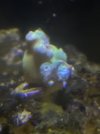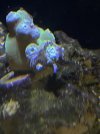My Duncan coral is turning brown. For reference it is still opening fully but I tried to blow off the brown stuff to make sure it wasn’t brown jelly, so he closed when I was doing that. I don’t think it’s possible for this to be the cause but I just switched to new noopsyche lighting a couple of days ago. Could this light be too strong? There’s a hammer coral next to it, that is thriving. I haven’t seen any aggression from it and I don’t see how it could reach it.
thanks in advance


Tests I did
Using Salifert
Alk: 9.3
Ph: around 8.0/8.1
Nitrate: 0
thanks in advance


Tests I did
Using Salifert
Alk: 9.3
Ph: around 8.0/8.1
Nitrate: 0
